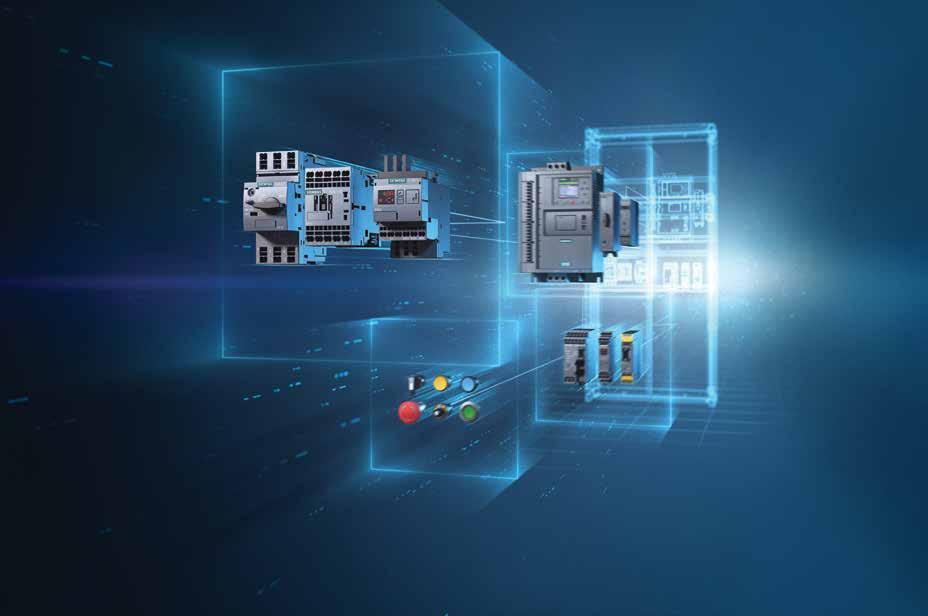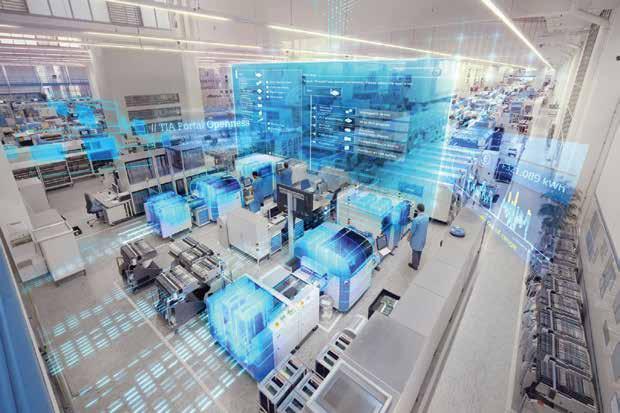
5 minute read
DIGITISATION
APS eyes long-term partnerships as key to helping industry move forward
Food & Industry Beverage News explains why at just 18 months old, APS is already making waves in the automation sector.
APS has a huge portfolio of gear for automating plant.
APS was born on March 1st, 2018, a time seen by the company as when it provided industry with a new choice by consolidating what can at times be a fragmented market. It brought a range of high-visibility brands in the industrial low- and medium-voltage electrical and automation space under one roof.
Headed by industry leader Lloyd Thomas (chairman – APS Group) and David Hegarty (managing director – APS Industrial), APS came into being when two companies were acquired – Ramelec and HiTech Control Systems. Thomas and his board then quickly set about putting national distribution deals in place with highly rated global manufacturers such as Siemens, Rittal and Weidmüller.
Siemens has a leading global market share, but less so in Australia. It was the apple in Thomas’s eye
when he thought about putting APS together.
Building on that, APS then signed national distribution deals with a range of other German companies including the aforementioned Rittal and Weidmüller. Other brands under its umbrella include KATKO and Epcos (TDK). In Hegarty’s words, APS has become a “one-stop shop for industrial automation and power distribution needs”. As if to reiterate the point, Hegarty is also clear on what APS has to offer the market.
“The advantage we bring to local customers is that not only do we sell quality products but the breadth of our portfolio is so impressive,” he said. “Our global manufacturing partners produce an incredible number of products and that’s what we give the local market access to. We are giving consumers a large choice in one place.”
APS is here for the long game, and doesn’t consider itself an overnight success, despite its rapid rise in the industrial electrical space, said Hegarty. He also knows the direction the company is heading is the right one. He feels that the sooner the industry can appreciate the benefits of Industry 4.0 and commence their digital journey, the better for all companies participating in the Australian industrial ecosystem.
“I was at the Siemens Digitalise 2019 in Brisbane, and it is clear a key challenge that the industry is going to face is getting started on their digitisation journey,” he said. “There are already early adopters paving the way, and there are going to be more examples of this over the next six months where companies are willing to take a step from what they are currently doing manufacturing, product and process wise. They’ll say, ‘we’re on the cusp of something big here and we are going to take these first steps to go down the path of digitisation and are ready to commence our journey. It takes courage, but we are going to do it because this is how we will survive and thrive. We have to’.”
Siemens invest billions of euros globally on research and development and the whole idea of Industry 4.0 and smart manufacturing, said Hegarty. They are leading the way and that APS can exclusively help bring this to Australia is a unique point of difference for him.
“Take a brand like Siemens – when all of your products are from the same manufacturer you get unrivalled communication and integration capability – power distribution, automation, motor control – everything comes from
APS’s David Hegarty believes that embracing digitisation is a win-win situation for the Australian industrial ecosystem.

the same manufacturer and are all connected,” he said. “Nobody else can offer this. In terms of what industries that suits, manufacturing is obviously a big one, as well as mining and utilities who are the ultimate beneficiaries of this performance and data visibility. Switchboard builders can see the benefits, as well as wholesalers and contractors. For the end user, it ultimately means they can manufacture more efficiently, have less downtime, and experience gains across their operation that are currently unattainable. Our manufacturing partners are also at the pointy end of Industry 4.0. This should provide the local market with a lot of faith in terms of what we can offer and help them achieve.”
Hegarty also said that APS will now give local manufacturers more of a choice when it comes to industrial, electrical and automation gear. He knows it will take time for consumers to get to know the company, but is confident that what they have to offer is something unique.
“We want to be in the conversation and we want the industry to understand the full benefits of Industry 4.0,” Hegarty said. “The suite of products, the communication abilities of digitisation technology are what are important and we want to be a trusted partner in that space. Within the next few years we will have proven our offerings to industry, and they will consider us a trusted advisor and partner.”
APS is seen as a relatively new player in the market, but its already having an impact on the industry. This is proven by not only the increase of staff since inception (it has almost tripled), but also by the amount of investment it has put into bricks and motor.
“In September 2018, we moved to a brand-new national distribution centre in Melbourne,” said Hegarty. “And that allowed us to dramatically increase our stock holdings and invest in expanding our team. In August this year, our Queensland office also moved into a new facility, to do the same.”
Although still only young in terms of being in existence, it is the experience it has behind it at management level that will make APS a long-term player in what is an increasingly competitive market. F











